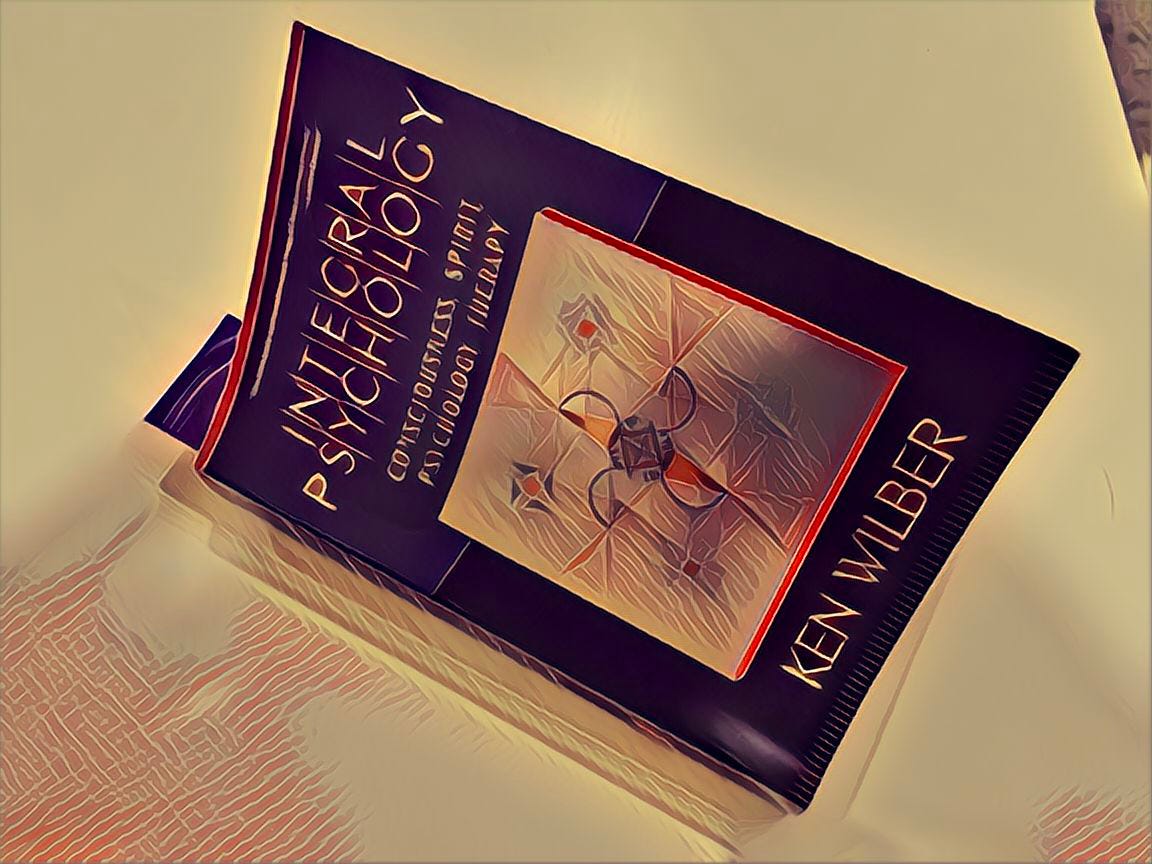In Integral Psychology (2000), Ken Wilber develops a concept of the self as a “self system” with multiple related waves, streams, or structures. Into this notion he enfolds the separate systems from various psychological disciplines including behaviorism, psychoanalysis, ego psychology, psychology of morality, life stage psychology, and more.
The self system of Wilber’s design is a machine with five major moving parts: the vertical stages/waves of development, the lines upon which those streams travel, states of consciousness occurring along those stage/lines, quadrants delineating fundamental distinctions of subject/object and individual/collective, and the horizontal typologies in which discrete personalities manifest. Combined and pointed like a microscope on a person’s life, the result is a sort of integral psychograph.
It is worth noting, I think, that this system accommodates a seemingly comprehensive variety of theoretical positions within itself. This is made possible by Wilber’s definition of psychology: “Psychology is the study of human consciousness and its manifestations in behavior.” (Wilber, 2000). Because psychology is consciousness and philosophers and spiritual thinkers also look at consciousness, Wilber defines the topic broadly enough to allow for a lively discussion that makes some interesting and unusual claims about topics as various as the dissolution of apartheid in South Africa and the tragedy of postmodern relativism.
Wilber can address each of the different schools of thought on the self in turn and say, “You are only looking at this part of the self. Look around you, there are other students of consciousness looking at another part.” He also has a way of citing authorities in the field to bolster his claims in a way that suggests that all the smartest people might agree with him more than they disagree. In this way, he makes a seemingly compelling case for a more expansive and open-minded psychology than most others have contemplated.
While this approach isn’t everyone’s cup of tea, I find it satisfying because everyone needs to look up from their narrowly focused specialties once in a while and get a glimpse of majestic mountains of knowledge under a wide blue sky of conceptual clarity. Who can argue with the merits of linking the subject of psychology to wisdom, meaning “the best that any era has to offer” (p. 9). Who doesn’t want to see the outcome of research linking the proximate self (a sense of “I” near to the subject) to the perennial philosophy (Wilber: “For it is the proximate self that is the navigator through the basic waves in the Great Nest of Being.” (p. 35))
Integral psychology is a shade brighter and bolder than the average psychology, but it loses something for the effort. Lessened, if not exactly lost, in the 36,000-foot view is the exactness and technical precision with which theorists like Piaget and Kohlberg formulated their ideas. Even developmental thinkers such as Gilligan and Kegan are treated with extraordinary brevity. One can argue that this isn’t a full-fledged book so much as an outline that has not been filled in.
As a result, any student of Wilber who has not spent years amassing in-depth field expertise must struggle with questions about the fairness and accuracy of Wilber’s descriptions of them. As much of Ken wants to show us the forest lost from looking at the trees, to what extent is he showing us a green-colored blur and telling us to trust him, that he’s visited there and it’s definitely a forest? I’m not saying Ken took any undue liberties, I’m just saying that I haven’t read all that he’s read and can’t vouch for it all personally.
In my own life, I’ve pointed the integral psychograph at my life many times and, as a member of a cohort of students of Dr. Terri O’Fallon, have been the subject of psychological research. The first time I took an integral assessment exam (one administered by Dr. Cook-Greuter in 2010), I was terrified that it was going to reveal that I was red or amber and all my writings about integral philosophy were therefore a massive self-delusion.
Whew! I wasn’t amber. I tested turquoise with strong notes of green and teal, which helped to frame my life story in a particular way. The merely theoretical stage descriptions in the textbooks were no longer theoretical. I could own them as one way of looking at myself. After getting some external validation for what I already knew intimately and had written about publicly, I could proceed without so many self-doubts and get on with the messy business of being a “turquoise person in an amber/orange world”.




